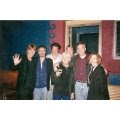Tuesday, November 25, 2003
I was recently invited to write about albums that I thought were, "great."
Here are three examples of albums I really enjoy.
----------------------------------------------------
Marty Scorsese's seven part Blues series on Public Broadcasting (reason alone to support PBS) has resulted in a flood of blues compilations CDs. Instead of starring at Homer's massive blues CD selection with glassy eyes and a furrored brow, start your search for the perfect introductory blues album with the 21 track album, 'Martin Scorsese Presents The Best of the Blues.'
Begining with a recording by the legendary King of the Delta Blues, Robert Johnson (Cross Road Blues: later covered by Cream), this album weaves it way chronologically through the history of this great American artform. This album is uniquely intelligent in that it includes pivitol tracks which document the various "schools" of blues or "mark" the four basic "waves" of each period of blues; early recordings, Chicago & electric, the British hand it back to Rock, and the SRV-impact.
From the delta, the album travels north on the Blue Highway to Chicago: Howlin Wolf (Evil) and Muddy Waters (Hoochie Coochie Man). The album includes the foundation of Britian's blues revival with the recording of "All Your Love" by John Mayall and the Bluesbreakers featuring Eric Clapton. The '60's embrace of the blues in a rock context is shown with tracks by Janis Joplin (One Good Man) Jimi Hendrix Experience (Red House), and southern blues with the Allman Brother's, "One Way Out" (live). Along the way you hear music by Ray Charles, Skip James, John Lee Hooker, Etta James, and the mandatory, "The Thrill is Gone" by B. B. King.
Passing from ancient history io the modern era this album kicks off the fourth era of blues with the modern mastery of Stevie Ray Vaughan. The CD makes a critical statement by including tracks by Keb Mo', Los Lobos, Susan Tedeschi, and a duet by Shemekia Copeland with Robert Cray.
All in all this is an excellent blues CD that can easily supplement a fine collection or serve as the foundation to help someone you love and care about (Rap-Victim).
------------------------------------------------------
At some point in their lives music fans come to a realization that there are only two kinds of music: good music and bad music. When this epiphany strikes vast catalogues and hidden genres open. In the mid-80's, with the seemingly simultaneous debut releases by Dwight Yoakum, Randy Travis and Steve Earle, I began to discover country music.
Before we get too carried away I feel the need to distance "good" country music from the pig-noise feeding the death knell of today's country radio music. In the remarkable but unheard category of great country artists are Kim Richey and Heather Myles.
While her third (though first nationally distributed) album, Highways & Honky Tonks, was stunning, 'Sweet Talk and Good Lies' by Heather Myles (2000) is destine to become a classic country album: a defining moment in the course of country music's future.
Duets with Merle Haggard and Dwight Yoakum stamp "approved" on Myle's. Her covers of "By the Time I Get to Phoenix," "Cry Me a River," and "Chapel of Love" allow first time listeners easy access to Myles recordings, but it is her own songs that exemplify how significant this relative unknown will be. As is required of any pertinent female country music singer, Myles is easy on the eyes but this time it's her music that draws you in and keeps you reaching for her music.
Rolling Stone writer Chet Flippo wrote, "Myles has more brass than a hardware store." Myles is a musical force that will continue to attract attention and move the course of country music.
------------------------------------------------------
When people flippantly say an album is, "great" I immediately whip out the musical yardstick: "Do you mean it's as good as The Who's, 'Who's Next' ?" Usually not.
When Townshend and band scrapped the multi-disc Lifehouse project in 1971 and culled the recordings down to one disc, the album was named 'Who's Next.' Thirty-one years later the label released a remixed, remastered two CD version of Who's Next Deluxe Edition which includes live cuts as well as other tracks not included on the maiden release but recorded as a part of the Lifehouse project.
Packed with rock anthems (Baba O'Riley / Won't Get Fooled Again) and tasty ballads (Bargain / Behind Blue Eyes); while the Beatles were the first significant group for a generation, and the Rolling Stones remain rock music's greatest live band (still !), Who's Next is the definitive rock album by which all "great" rock albums should be measured.
Townshend uses the rock format to discuss pertinent political, social, and hormonal themes. Unlike so many of it's contemporary albums, after 33 years, 'Who's Next' remains fresh and exciting.
Thursday, January 10, 2008
Subscribe to:
Post Comments (Atom)











No comments:
Post a Comment